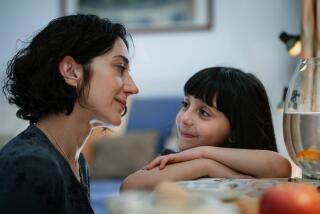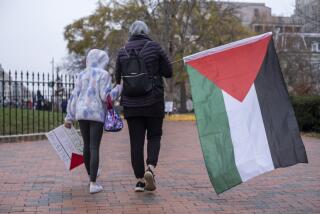A pediatrician takes pride in her Afghan cabdriver father
- Share via
In the morning, before my father and I go our separate ways to work, we chat amiably. “Good luck on your day.” “Hope business is good.” And our one response to everything: “Inshallah.” God willing.
I get into my mini-SUV and head off to the hospital, groaning about the lack of sleep, the lack of time, but also knowing that I am driving off to what has always been my dream.
My father gets into his blue taxi, picks up his radio and tells the dispatcher he’s ready. Then he waits. He waits for someone wanting to go somewhere. He waits to go home to my mother, the woman he calls “the boss.” Maybe today will be a good day. He will call her up and tell her he is taking her out tonight. He can do that now that we’re all grown up; now that he doesn’t have to save every dime for the “what-ifs” and the “just-in-cases.”
There is very little complaining in his car. His day starts off with a silent prayer, then a pledge: Hudaya ba omaide hudit. God, as you wish. Then he hums or sings. Some songs are about love and some about loss. They are all about life. He sings. He smiles the whole time.
My father is the type of person who is content to listen, but I love it when he speaks. There is wisdom there, although he does not intend there to be.
“What’s new?” he’ll ask over a Saturday morning breakfast.
“Not much,” I reply. “My life revolves around these books, Dad; there is little to say unless you want to hear about the urinary tract.”
“You know when Gandhi’s minister of foreign affairs died, his only true possessions were books. It is the sign of a life worth living,” he replies and begins to butter his toast.
Sometimes, the years of education and learning shine through the injuries and lost dreams. I get a glimpse of the man who once existed, and the one who never will. Who would he have been, I wonder, if the bombs hadn’t come down in 1978? What if I could take away the time he spent in a coma, the years of treatment and surgery, the broken bones and disabilities. What if there were no refugee ghettos, no poverty, no fear, no depression written in his life history. Who could he have been? The thought saddens me, but intrigues me as well. Is it possible that he is who he is because the life he has lived has been filled with such tragedy? Perhaps these stories were the making of my hero.
Sometimes he’ll tell me about his college days, about an Afghanistan I have never known and very few people would believe ever existed.
“In the College of Engineering, there was this lecture hall, with seats for 1,000 students,” his says as eyes begin to get bigger. “At the end of the lecture, the seats would move. The whole auditorium would shift as you spun along the diameter. The engineering of the building itself was very interesting.” He continues to describe the construction details, then sighs. “I wonder if it’s still around?”
There is a pause. For 25 years I have tried to fill that silence, but I have never quite figured out what to say. I guess silence goes best there. He is the next one to speak. “You see, even your old-aged father was once part of something important.”
When he says things like that I want to scream. I don’t want to believe that the years can beat away at you like that. I don’t want to know that if enough time passes, you begin to question what was real or who you are. I am unconcerned with what the world thinks of him, but it is devastating to know that he at times thinks less of himself.
We are the same, but we are separated. People don’t see him in me. I wish they would. I walk in with a doctor’s white coat or a suit or my Berkeley sweatshirt and jeans. High heels or sneakers, it doesn’t matter, people always seem impressed with me. “Pediatrician, eh?” they say. “Well, good for you.”
I wonder what people see when they look at him. They don’t see what I see in his smile. Perhaps they see a brown man with a thick accent; perhaps they think, another immigrant cabdriver. Or perhaps it is much worse: Maybe he is a profile-matched terrorist, aligned with some axis of evil. “Another Abd-ool f-----g foreigner,” I once heard someone say.
Sometimes the worst things are not what people say to your face or what they say at all, it is the things that are assumed. I am in line at the grocery store, studying at a cafe, on a plane flying somewhere.
“Her English is excellent; she must have grown up here,” I hear a lady whisper. “But why on earth does she wear that thing on her head?”
“Oh, that’s not her fault,” someone replies. “Her father probably forces her to wear that.”
I am still searching for a quick, biting response to comments like that. The trouble is that things I’d like to say aren’t quick. So I say nothing. I want to take their hands and pull them home with me. Come, meet my father. Don’t look at the wrinkles; don’t look at the scars; don’t mind the hearing aid, or the thick accent. Don’t look at the world’s effect on him; look at his effect on the world. Come into my childhood and hear the lullabies, the warm hand on your shoulder on the worst of days, the silly jokes on mundane afternoons. Come meet the woman he has loved and respected his whole life; witness the confidence he has nurtured in his three daughters. Stay the night; hear his footsteps come in at midnight after a long day’s work. That sound in the middle of the night is his head bowing in prayer although he is exhausted. Granted, the wealth is gone and the legacy unknown, but look at what the bombs did not destroy. Now tell me, am I really oppressed? The question makes me want to laugh. Now tell me, is he really the oppressor? The question makes me want to cry.
At times, I want to throw it all away: the education, the opportunities, the potential. I want to slip into the passenger seat of his cab and say: This is who I am. If he is going to be labeled, then give me those labels too. If you are going to look down on him, than you might as well peer down on me as well. Close this gap. Erase this line. There is no differentiation here. Of all the things I am, of all the things I could ever be, I will never be prouder than to say that I am of him.
I am this cabdriver’s daughter.
Waheeda Samady is the pediatric chief resident at UC San Diego’s Rady Children’s Hospital and a committee member of CAIR San Diego. A version of this article appeared in the anthology “Snapshots: This Afghan American Life.”
More to Read
Sign up for Essential California
The most important California stories and recommendations in your inbox every morning.
You may occasionally receive promotional content from the Los Angeles Times.










